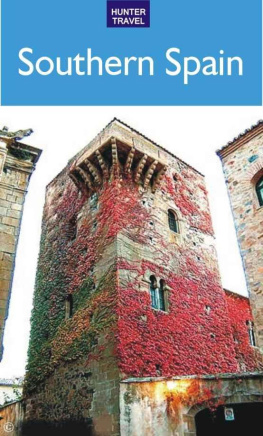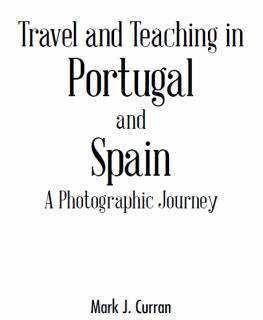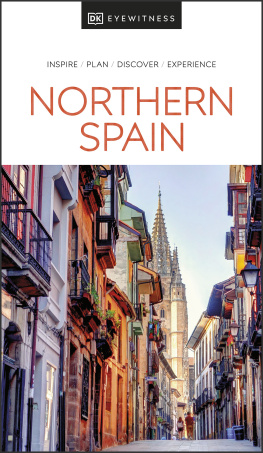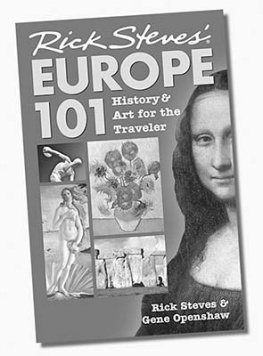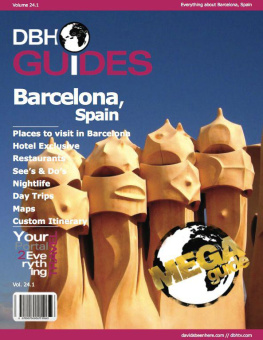Northern Spain Travel Adventures
Kelly Lipscomb
Hunter Publishing, Inc.
HUNTER PUBLISHING, INC,
comments@hunterpublishing.com
Ulysses Travel Publications
4176 Saint-Denis, Montral, Qubec, Canada H2W 2M5
514-843-9882, ext. 2232; fax 514-843-9448
Windsor Books
The Boundary, Wheatley Road, Garsington, Oxford, OX44 9EJ England
01865-361122; fax 01865-361133
Hunter Publishing, Inc.
All rights reserved. No part of this publication may be reproduced, stored in a retrieval system, or transmitted in any form, or by any means, electronic, mechanical, photocopying, recording, or otherwise, without the written permission of the publisher.
This guide focuses on recreational activities. As all such activities contain elements of risk, the publisher, author, affiliated individuals and companies disclaim any responsibility for any injury, harm, or illness that may occur to anyone through, or by use of, the information in this book. Every effort was made to insure the accuracy of information in this book, but the publisher and author do not assume, and hereby disclaim, any liability for any loss or damage caused by errors, omissions, misleading information or potential travel problems caused by this guide, even if such errors or omissions are the result of negligence, accident or any other cause.
Preface
" Sometimes the traveler feels completely transfixed by things he cannot explain." Camilo Jos Cela , Journey to the Alcarrin
A world of change occurs as the connection between a traveler and Spain becomes more intimate, as the initial feelings of exhilaration wane. Is this the point when the traveler knows he is finally at home in Spain, comfortable in his relationship with the country? It is, perhaps, just the beginning of a change in perceptions. For then the locked doors of Spain will begin to open up; instead of seeing just ancient walls with a story to them, there is also a family waiting behind those walls to tell its own stories. The traveler is then one step closer to realizing what George Orwell described as the "far off rumor of Spain that dwells in everyone's imagination."
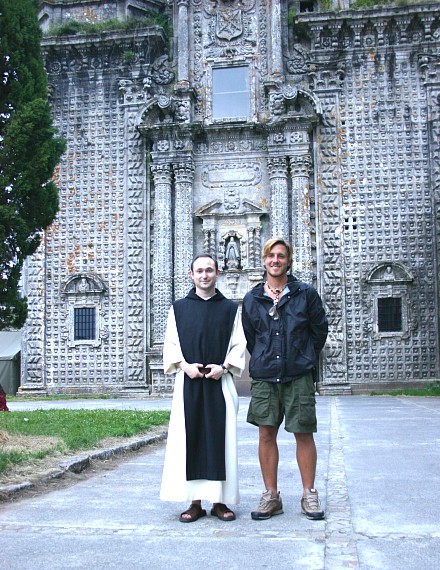
The author with a monk at the Monastery of Sobrado dox Monxes, founded 952 AD.
This peninsular country at the southwestern tip of Europe just north of Africa is all that has been said and written about it, the many cumulative experiences of the Romans, Moors, Gypsies and Catholics that have made it and the world what they are today. But there is more if the traveler begins to look more closely, between the squat doorways of Granada's Albaicn, beyond the battlement walls of vila, to see what else is there.
In reporting on the most fabled or inherently interesting Spanish cities and pueblos along with the outdoor adventures throughout the country, this book fills a vacancy on bookstore shelves. Somewhere between the city guides and the few books devoted to the natural spaces of Spain there is now a book inspired by both, intended to develop the idea that the time-honored tourist routes can complement the country's natural spaces and the adventures they offer. This book can't cover every single detail of the country. What book could? A little of Spain should be left to the imagination; what I saw you may not see and what I missed is left for you to discover.
The traveling and writing undertaken for this book were done with the thought that it is good to be different from the guidebook-toting travelers of the city; to be the one who moves not just with the crowds but away from them at times, to step off the beaten trail, be it to a village whose people haven't seen a foreigner for over a year, or to an outdoor space where a guidebook can be replaced by a surfboard, a parasail or an oar. But it is most rewarding to be both kinds of traveler. There is no law that says the traveler who follows obediently behind a tour guide cannot also be the first to jump off the bridge and stretch out the bungee cord toward the river far below. Without the beaten paths we might never have found that undisturbed village in Galicia, that empty surfing beach on the Costa de la Luz, the thermals off that Alpujarran peak or those rapids in northern Castilla y Len. The Spanish culture that should not be missed is indelibly linked to the land of mountains, rivers and coasts, olive trees and lemon groves, grapes, green forests and parched plains that gave rise to it. As the revered Spanish writer and intellectual Miguel de Unamuno observed, "there is no landscape without history." Furthermore, without the well-worn cobblestones of Granada's monumental Alhambra, Barcelona's Las Ramblas or Madrid's Plaza Mayor, we might never have come to Spain in the first place, and what a shame that would have been.
Kelly Lipscomb
About the Author
Kelly Lipscomb originally came to Spain as a backpacker and student of Spanish. After several years he moved from his home in Granada north to Barcelona, then began traveling through every region of the country - exploring the cities, the islands, and the wildest, most adventurous areas. His experiences in writing this book include stalking prehistoric dolmens across Extremadura, eating cow intestines in Toledo, climbing Mt. Teide in Tenerife and, most recently, hiking the 500-mile coastal route of the Camino de Santiago.
Dedication
In loving memory of Brian King, with whom I first discovered Spain.
- Valle de Roncal
- Valle de Roncal
- Sangesa/Zangotza
- Useful Information
- Sightseeing
- What to Eat & Where
- Excursions from San Sebastin
- Useful Information
- Festivals
- Getting Here & Away
- Sightseeing
- Additional Reading
- Spanish Vocabulary
- DAYS OF THE WEEK
- MONTHS OF THE YEAR
- NUMBERS
- CONVERSATION
- TELLING TIME
- DIRECTIONS
- ACCOMMODATIONS
- EATING & DRINKING
- TRAVEL
- Asturias
- Galicia
- Where to Stay & Eat
- Excursions from Orense
- Useful Information
- Festivals
- Getting Here & Away
- Sightseeing
- Nightlife
- Where to Stay
- What to Eat & Where
- Ferrol
- Cedeira
- Viveiro
- Ribadeo
- Additional Reading
- Spanish Vocabulary
- DAYS OF THE WEEK
- MONTHS OF THE YEAR
- NUMBERS
- CONVERSATION
- TELLING TIME
- DIRECTIONS
- ACCOMMODATIONS
- EATING & DRINKING
- TRAVEL
Introduction
How To Use This Book
The Spanish government has done much of the work for me. Since the fall of dictatorship in the mid-1970s, Spain has been separated into 17 autonomous communities with broad powers of governing its individual provinces; all are under the central authority of Madrid, which concerns itself primarily with national issues such as currency and foreign relations. Most of these regions have, in fact, been geographically and, largely as a result, politically and culturally distinct from one another since the beginning of Iberian civilization. It was not my intention to inundate the reader with copious information about all the wrong places - for instance, the uninhabited island of Ceuta or Albacete, a city that was described to me by one of its own as "nothing but dusty streets and an ugly church." After a short visit, I concurred. Nor was it feasible to detail every minor hiking trail in the Picos de Europa when there are five major ones that history has decided are the best. Spain has much to offer and most travelers have limited time to experience it, which mandates that time be well spent.


